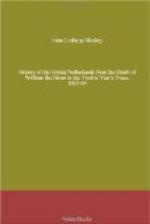There should be three religions, said Elizabeth—not counting the dispensation from Mecca, about which Turk and Hun might be permitted to continue their struggle on the crepuscular limits of civilization. Everywhere else there should be toleration only for the churches of Peter, of Luther, and of Calvin. The house of Austria was to be humbled —the one branch driven back to Spain and kept there, the other branch to be deprived of the imperial crown, which was to be disposed of as in times past by the votes of the princely electors. There should be two republics—the Swiss and the Dutch—each of those commonwealths to be protected by France and England, and each to receive considerable parings out of the possessions of Spain and the empire.
Finally, all Christendom was to be divided off into a certain number of powers, almost exactly equal to each other; the weighing, measuring, and counting, necessary to obtain this international equilibrium, being of course the duty of the king and queen when they should sit some day together at table.
Thus there were five points; sovereigns and politicians having always a fondness for a neat summary in five or six points. Number one, to remodel the electoral system of the holy Roman empire. Number two, to establish the republic of the United Provinces. Number three, to do as much for Switzerland. Number four, to partition Europe. Number five, to reduce all religions to three. Nothing could be more majestic, no plan fuller fraught with tranquillity for the rulers of mankind and their subjects. Thrice happy the people, having thus a couple of heads with crowns upon them and brains within them to prescribe what was to be done in this world and believed as to the next!
The illustrious successor of that great queen now stretches her benignant sceptre over two hundred millions of subjects, and the political revenues of her empire are more than a hundredfold those of Elizabeth; yet it would hardly now be thought great statesmanship or sound imperial policy for a British sovereign even to imagine the possibility of the five points which filled the royal English mind at Dover.
But Henry was as much convinced as Elizabeth of the necessity and the possibility of establishing the five points, and De Bethune had been astonished at the exact similarity of the conclusion which those two sovereign intellects had reached, even before they had been placed in communion with each other. The death of the queen had not caused any change in the far-reaching designs of which the king now remained the sole executor, and his first thought, on the accession of James, was accordingly to despatch De Bethune, now created Marquis de Rosny, as ambassador extraordinary to England, in order that the new sovereign might be secretly but thoroughly instructed as to the scheme for remodelling Christendom.




